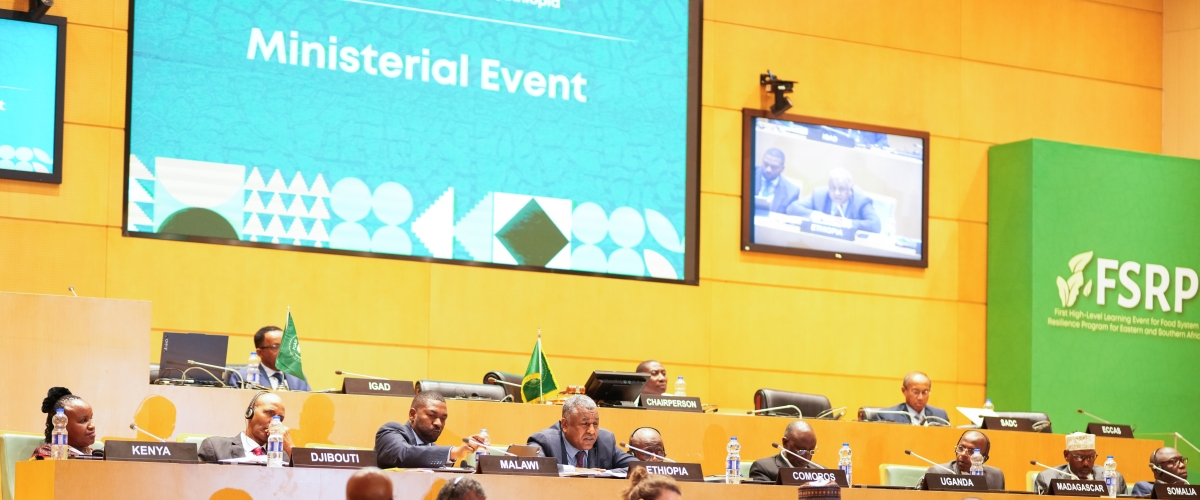
Ministers and senior representatives from Eastern and Southern Africa convened on March 6, 2025 in Addis Ababa, Ethiopia for the first High-Level Learning Event on the Food Systems Resilience Program (FSRP), reaffirming their commitment to strengthening regional trade integration, advancing food security, and enhancing the resilience of food systems across the region.
The ministerial meeting followed a two-and-a-half-day technical learning session where experts discussed key challenges and opportunities for learning and knowledge exchange in food systems resilience across three critical thematic areas:
- Digital Technologies in Agriculture – Exploring the role of precision agriculture, artificial intelligence (AI), and real-time climate data in improving productivity and reducing post-harvest losses.
- Trade Integration – Addressing barriers to agricultural trade, including sanitary and phytosanitary (SPS) measures, and leveraging trade scorecards to enhance market access.
- Knowledge Sharing and Learning Processes – Facilitating cross-country collaboration to drive sustainable solutions for food security challenges.
Regional Leaders Unite to Tackle Food Security Challenges
The high-profile gathering brought together key ministers and officials, including:
- Hon. Samuel Dalitso Kawale, Minister of Agriculture, Malawi • M. Ramindo Gaëtan, Secretary General and Chairman, FSRP Steering Committee, Madagascar
- H.E. Ibrahim Elmi Mohamed, Secretary General, Ministry of Agriculture, Djibouti
- Hon. Dr. Bright Kanyontore Rwamirama, State Minister, Ministry of Agriculture, Animal Industry and Fisheries, Uganda
- H.E. Ibrahim Tanimu, Representative of the Minister of Agriculture, Nigeria
- H.E. Fry Kouame Andre, Deputy Chief of Staff, Representative of the Minister of Agriculture, Côte d’Ivoire
- Amb. Assoumani, Ambassador of Comoros to Ethiopia and the African Union
- Prof. Razafinjara Aimé Lala, Chairperson of the CCARDESA Board of Directors
- Dr. Girma Amente, Minister of Agriculture, Ethiopia
- H.E. and Honourable Asad Abdirizak Mohamed, State Minister of Agriculture and Irrigation, Somalia • Priscilla Muiruri, National Project Coordinator, FSRP, Kenya
- H.E. Assoumani Mondoha, Ambassador to the African Union and Ethiopia, Comoros
Addressing Africa’s Growing Food Security Crisis
With food insecurity in Africa reaching critical levels, Ministers emphasized the need for urgent action through regional cooperation, policy alignment, and innovative solutions. The combined effects of climate change, economic instability, prolonged conflicts, and global supply chain disruptions have intensified vulnerabilities in agricultural production and food access across the continent.
Ministers reaffirmed their commitment to:
- Leveraging digital innovations – Investing in climate-smart technologies, AI, and real-time data monitoring to enhance farm productivity and reduce food losses.
- Strengthening trade integration – Harmonizing SPS standards, improving infrastructure, and implementing policies that facilitate intra-regional agricultural trade within the ambit of the African Continental Free Trade Area (AfCFTA)
- Promoting inclusive agricultural investments – Enhancing access to finance, capacity building, and technology adoption for smallholder farmers to boost market competitiveness.
- Fostering policy coordination – Strengthening regional collaboration and knowledge-sharing to accelerate resilience-building strategies.
Partnerships to Drive Resilience in Agriculture
The Centre for Coordination of Agricultural Research and Development for Southern Africa (CCARDESA), in collaboration with the Intergovernmental Authority on Development (IGAD), the African Union Commission (AUC), and the World Bank, reaffirmed their commitment to supporting food systems resilience across Eastern and Southern Africa. This partnership plays a vital role in scaling up evidence-based interventions that enhance agricultural productivity, improve market linkages, and promote sustainable food production.
By fostering cross-border collaboration, investing in climate-smart agriculture, and strengthening food value chains, stakeholders aim to equip African farmers with the tools needed to adapt to environmental changes. Efforts are also focused on improving institutional capacity and mobilizing resources to establish a better coordinated and resilient regional food system.
The ministerial meeting served as a critical platform for reinforcing political will, securing long-term investments, and strengthening multi-stakeholder partnerships to drive Africa’s food systems transformation. As the continent faces increasing food security challenges, leaders remain committed to building a more sustainable and resilient agricultural future for millions of people across the region.






